
Bucketfull Of Brains - March 1986

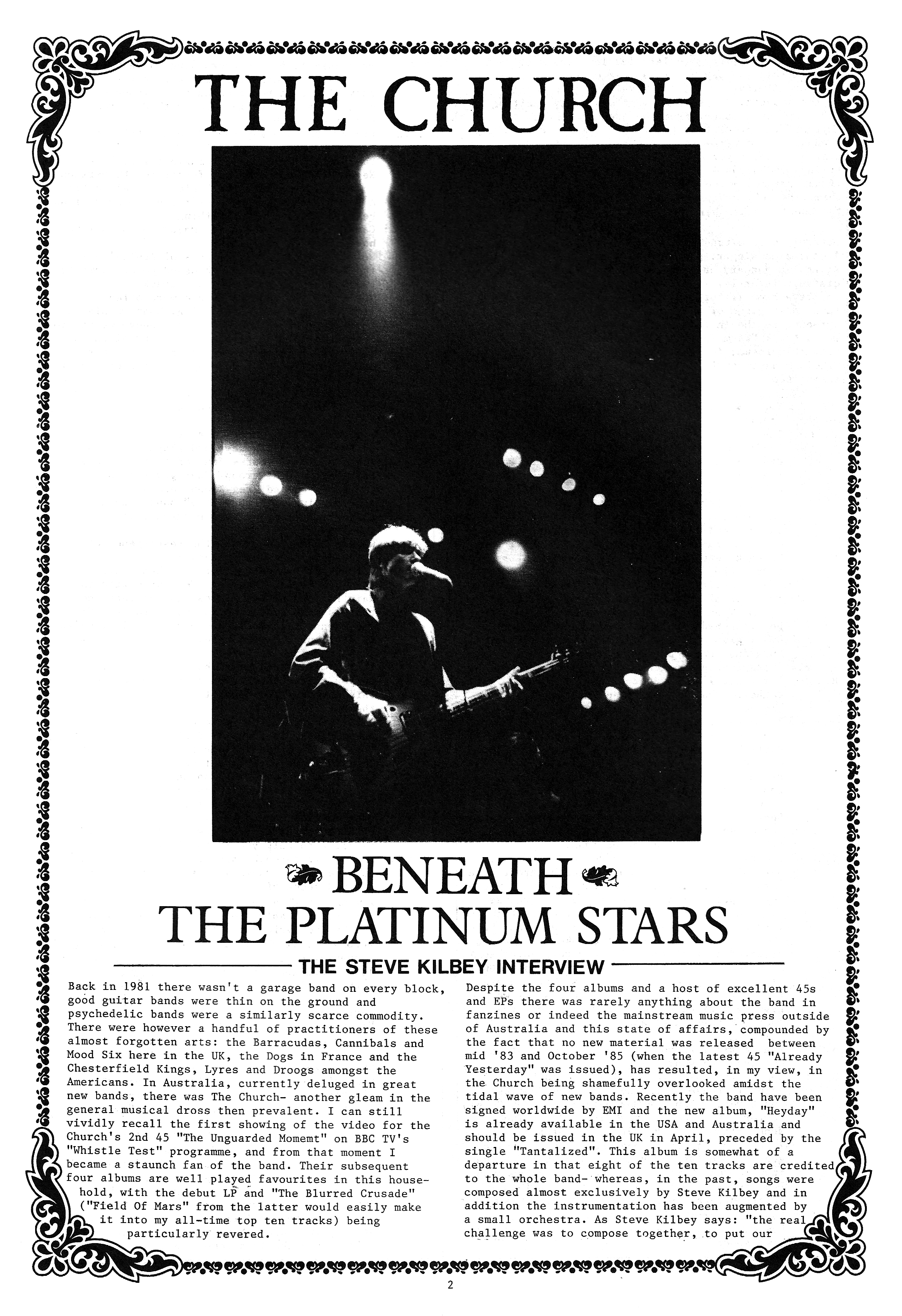
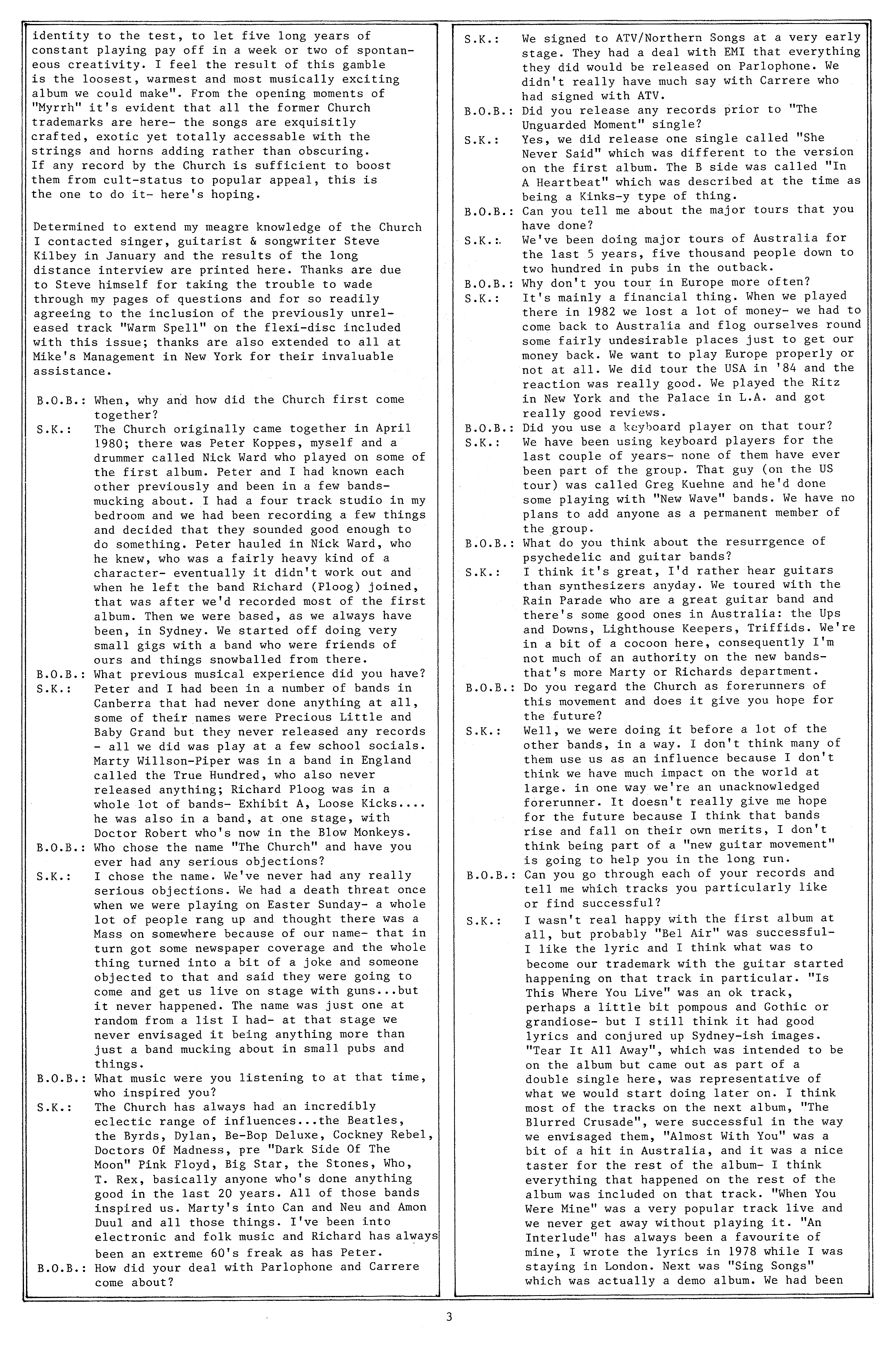
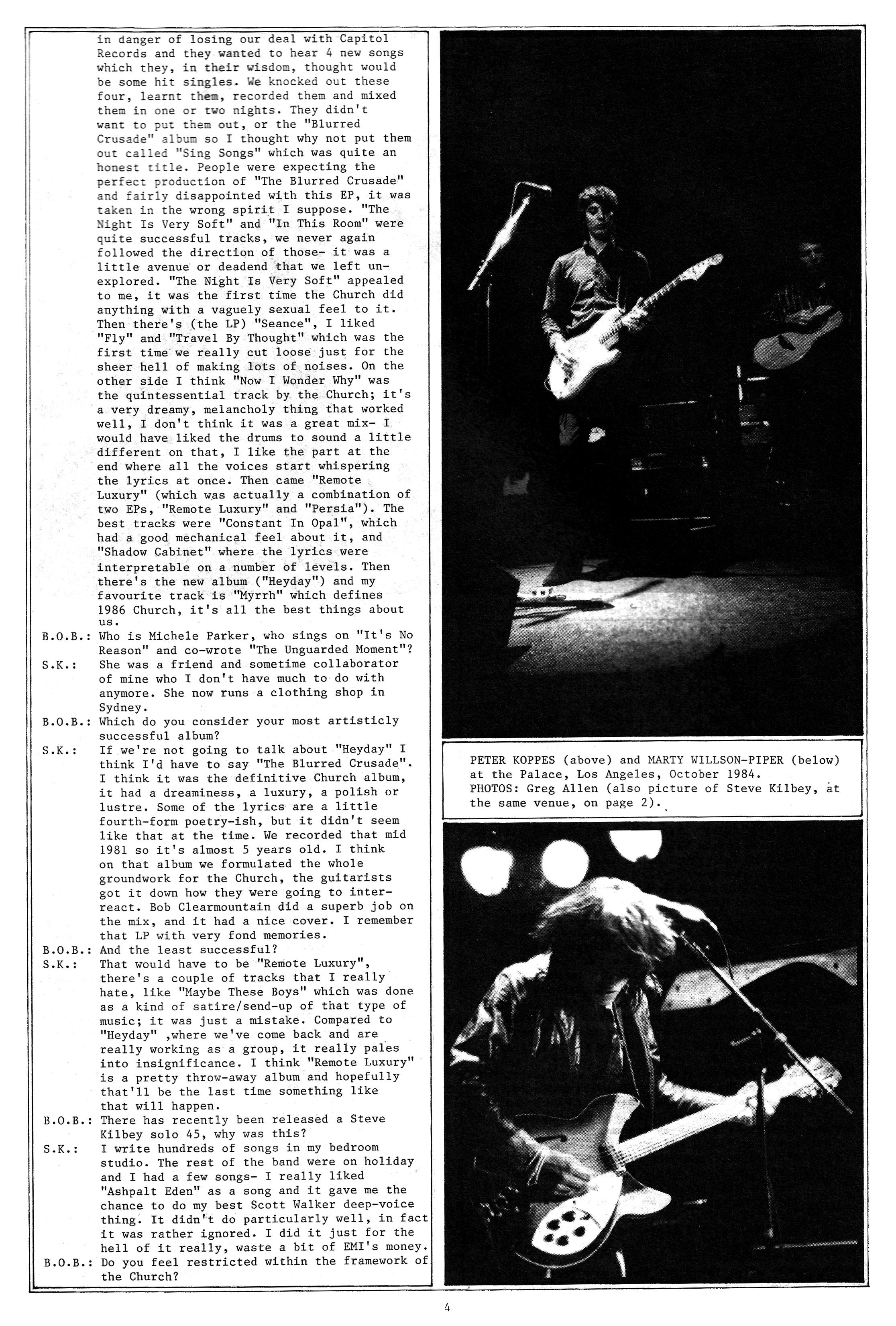
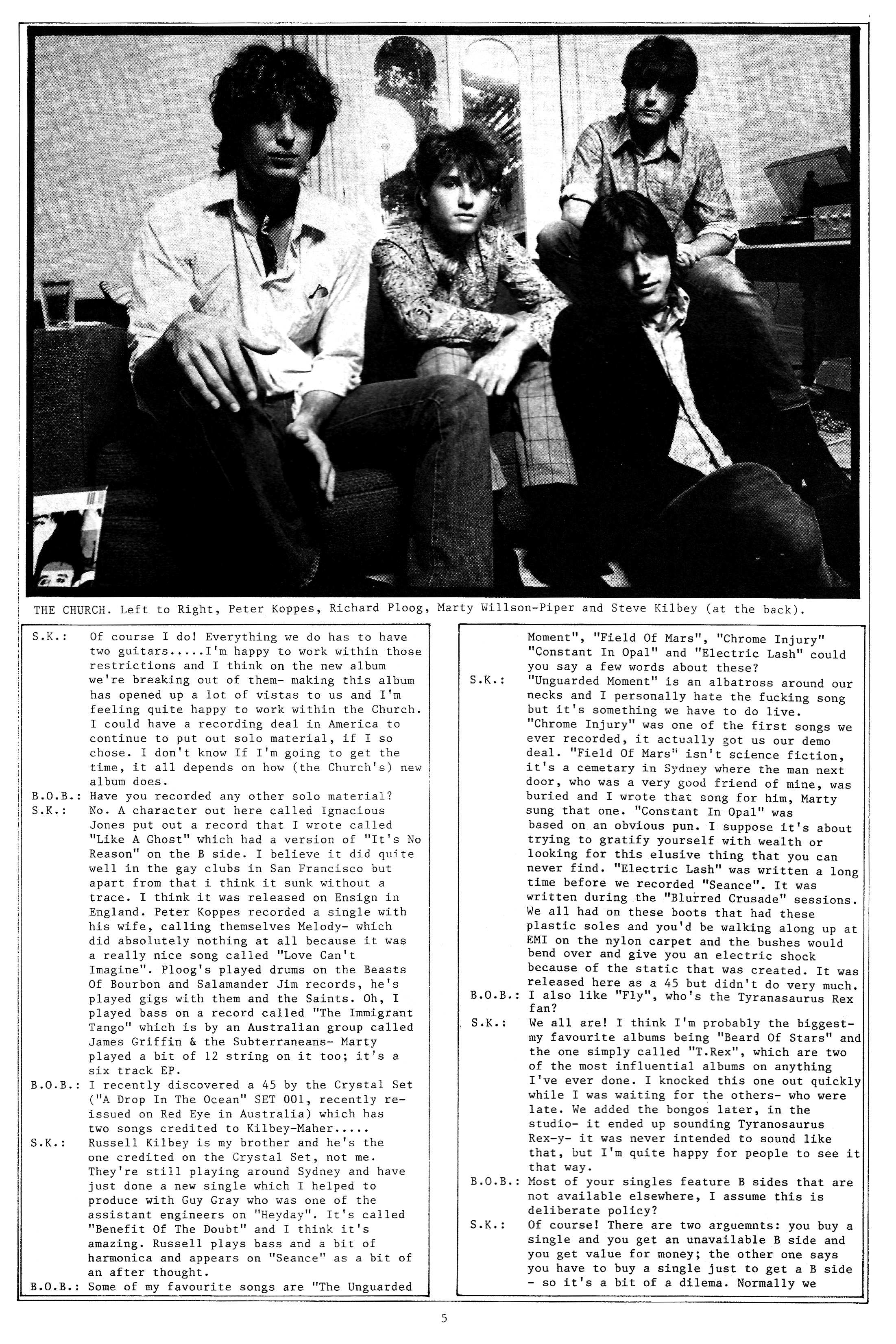
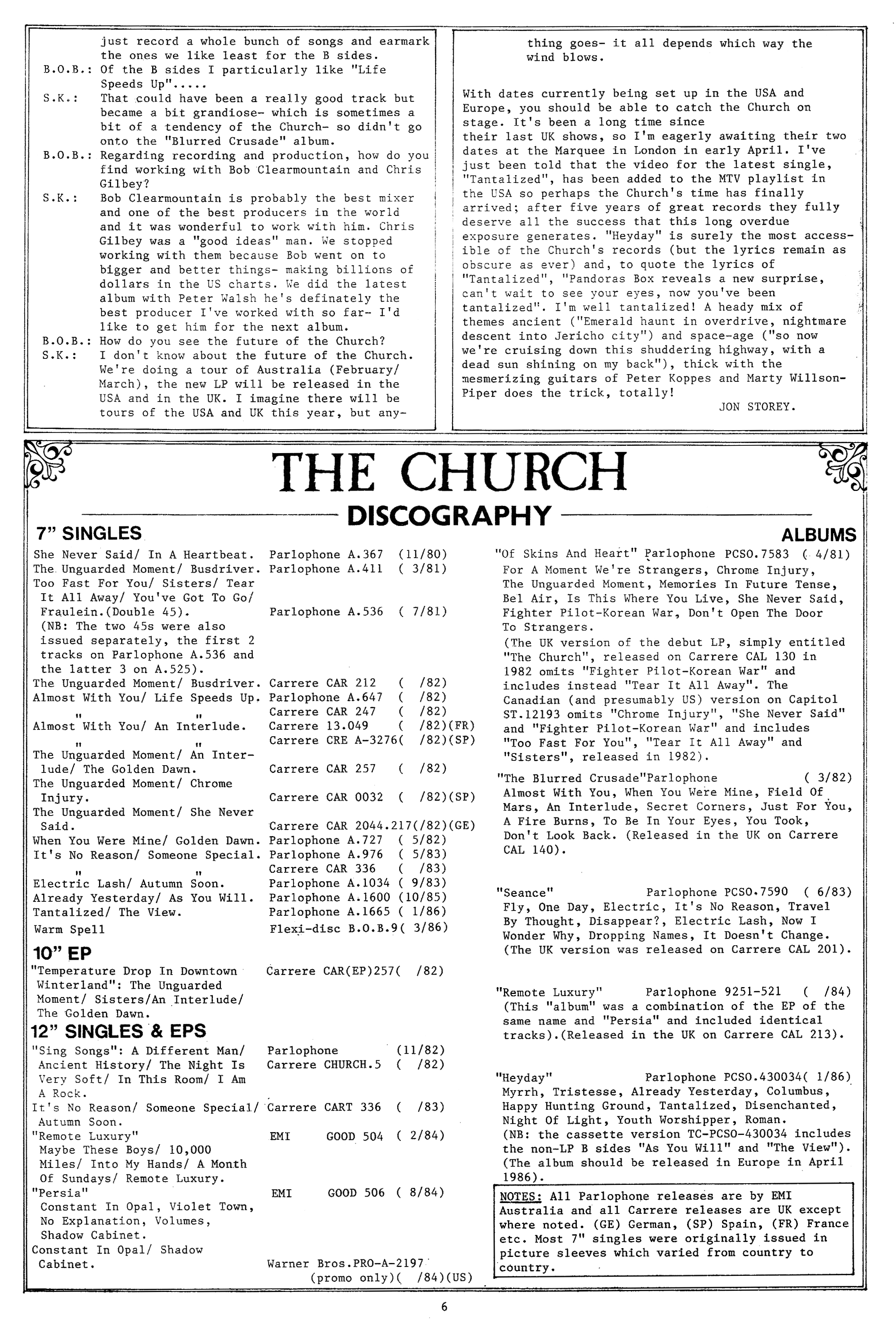

Bucketfull Of Brains - March 1986






(transcription from the old Shadow Cabinet website)
***********************************************************
Source: Bucketfull of Brains Magazine (London, Eng.)
Issue: No.15 Date: Feb, 1986
Subject: Interview - Steve Kilbey
***********************************************************
BEYOND THE PAIL
by Jon Storey
I'm particularly pleased to be able to include the "Warm Spell" flexi together with the Steve Kilbey interview.
THE CHURCH BENEATH THE PLATINUM STARS THE STEVE KILBEY INTERVIEW
By Jon Stoney
Back in 1981 there wasn't a garage band on every block, good guitar bands were thin on the ground and psychedelic bands were a similarly scarce commodity. There were however a handful of practitioners of these almost forgotten arts: the Barracudas, Cannibals and Mood Six here in the UK, the Dogs in France and the Chesterfield Kings, Lyres and Droogs amongst the Americans. In Australia, currently deluged in great new bands, there was The Church- another gleam in the general musical dross then prevalent. I can still vividly recall the first showing of the video for the Church's 2nd 45 "The Unguarded Moment" on BBC TV's "Whistle Test" program, and from that moment I became a staunch fan of the band. Their subsequent four albums are well played favorites in this household, with the debut LP and "The Blurred Crusade" ("Field Of Mars" from the latter would easily make it into my all-time top ten tracks) being particularly revered.
Despite the four albums and a host of excellent 45s and EPs there was rarely anything about the band in fanzines or indeed the mainstream music press outside of Australia and this state of affairs, compounded by the fact that no new material was released between mid '83 and October '85 (when the latest 45 "Already Yesterday" was issued), has resulted, in my view, in the Church being shamefully overlooked amidst the tidal wave of new bands. Recently the band have been signed worldwide by EMI and the new album, "Heyday" is already available in the USA and Australia and should be issued in the UK in April, preceded by the single "Tantalized". This album is somewhat of a departure in that eight of the ten tracks are credited to the whole band- whereas, in the past, songs were composed almost exclusively by Steve Kilbey and in addition the instrumentation has been augmented by a small orchestra. As Steve Kilbey says: "the real challenge was to compose together, to put our identity to the test, to let five long years of constant playing pay off in a week or two of spontaneous creativity. I feel the result of this gamble is the loosest, warmest and most musically exciting album we could make". From the opening moments of "Myrrh" it's evident that all the former Church trademarks are here- the songs are exquisitely crafted, exotic yet totally accessible with the strings and horns adding rather than obscuring. If any record by the Church is sufficient to boost them from cult-status to popular appeal, this is the one to do it- here's hoping.
Determined to extend my meager knowledge of the Church I contacted singer, guitarist & songwriter Steve Kilbey in January and the results of the long distance interview are printed here. Thanks are due to Steve himself for taking the trouble to wade through my pages of questions and for so readily agreeing to the inclusion of the previously unreleased track "Warm Spell" on the flexi-disc included with this issue; thanks are also extended to all at Mike's Management in New York for their invaluable assistance.
BOB: When, why and how did the Church first come together?
SK: The Church originally came together in April 1980; there was Peter Koppes, myself and a drummer called Nick Ward who played on some of the first album. Peter and I had known each other previously and been in a few bands- mucking about. I had a four track studio in my bedroom and we had been recording a few things and decided that they sounded good enough to do something. Peter hauled in Nick Ward, who he knew, who was a fairly heavy kind of a character- eventually it didn't work out and when he left the band Richard (Ploog) joined, that was after we'd recorded most of the first album. Then we were based, as we always have been, in Sydney. We started off doing very small gigs with a band who were friends of ours and things snowballed from there.
BOB: What previous musical experience did you have?
SK: Peter and I had been in a number of bands in Canberra that had never done anything at all, some of their names were Precious Little and Baby Grand but they never released any records - all we did was play at a few school socials. Marty Willson-Piper was in a band in England called the True Hundred, who also never released anything; Richard Ploog was in a whole lot of bands- Exhibit A, Loose Kicks.... he was also in a band, at one stage, with Doctor Robert who's now in the Blow Monkeys.
BOB: Who chose the name "The Church" and have you ever had any serious objections?
SK: I chose the name. We've never had any really serious objections. We had a death threat once when we were playing on Easter Sunday- a whole lot of people rang up and thought there was a Mass on somewhere because of our name- that in turn got some newspaper coverage and the whole thing turned into a bit of a joke and someone objected to that and said they were going to come and get us live on stage with guns...but it never happened. The name was just one at random from a list I had- at that stage we never envisaged it being anything more than just a band mucking about in small pubs and things.
BOB: What music were you listening to at that time, who inspired you?
SK: The Church has always had an incredibly eclectic range of influences...the Beatles, the Byrds, Dylan, Be-Bop Deluxe, Cockney Rebel, Doctors Of Madness, pre "Dark Side Of The Moon" Pink Floyd, Big Star, the Stones, Who, T. Rex, basically anyone who's done anything good in the last 20 years. All of those bands inspired us. Marty's into Can and Neu and Amon Duul and all those things. I've been into electronic and folk music and Richard has always been an extreme 60's freak as has Peter.
BOB: How did your deal with Parlophone and Carrere come about?
SK: We signed to ATV/Northern Songs at a very early stage. They had a deal with EMI that everything they did would be released on Parlophone. We didn't really have much say with Carrere who had signed with ATV.
BOB: Did you release any records prior to "The Unguarded Moment" single?
SK: Yes, we did release one single called "She Never Said" which was different to the version on the first album. The B side was called "In A Heartbeat" which was described at the time as being a Kinks-y type of thing.
BOB: Can you tell me about the major tours that you have done?
SK: We've been doing major tours of Australia for the last 5 years, five thousand people down to two hundred in pubs in the outback.
BOB: Why don't you tour in Europe more often?
SK: It's mainly a financial thing. When we played there in 1982 we lost a lot of money- we had to come back to Australia and flog ourselves round some fairly undesirable places just to get our money back. We want to play Europe properly or not at all. We did tour the USA in '84 and the reaction was really good. We played the Ritz in New York and the Palace in L.A. and got really good reviews.
BOB: Did you use a keyboard player on that tour?
SK: We have been using keyboard players for the last couple of years- none of them have ever been part of the group. That guy (on the US tour) was called Greg Kuehne and he'd done some playing with "New Wave" bands. We have no plans to add anyone as a permanent member of the group.
BOB: What do you think about the resurgence of psychedelic and guitar bands?
SK: I think it's great, I'd rather hear guitars than synthesizers any day. We toured with the Rain Parade who are a great guitar band and there's some good ones in Australia: the Ups and Downs, Lighthouse Keepers, Triffids. We're in a bit of a cocoon here, consequently I'm not much of an authority on the new bands- that's more Marty or Richards department.
BOB: Do you regard the Church as forerunners of this movement and does it give you hope for the future?
SK: Well, we were doing it before a lot of the other bands, in a way. I don't think many of them use us as an influence because I don't think we have much impact on the world at large. In one way we're an unacknowledged forerunner. It doesn't really give me hope for the future because I think that bands rise and fall on their own merits, I don't think being part of a "new guitar movement" is going to help you in the long run.
BOB: Can you go through each of your records and tell me which tracks you particularly like or find successful?
SK: I wasn't real happy with the first album at all but probably "Bel Air" was successful- I like the lyric and I think what was to become our trademark with the guitar started happening on that track in particular. "Is This Where You Live" was an OK track, perhaps a little bit pompous and Gothic or grandiose- but I still think it had good lyrics and conjured up Sydney-ish images. "Tear It All Away", which was intended to be on the album but came out as part of a double single here, was representative of what we would start doing later on. I think most of the tracks on the next album, "The Blurred Crusade", were successful in the way we envisaged them, "Almost With You" was a bit of a hit in Australia, and it was a nice taster for the rest of the album- I think everything that happened on the rest of the album was included on that track. "When You Were Mine" was a very popular track live and we never get away without playing it. "An Interlude" has always been a favorite of mine, I wrote the lyrics in 1978 while I was staying in London. Next was "Sing Songs" which was actually a demo album. We had been in danger of losing our deal with Capitol Records and they wanted to hear 4 new songs which they, in their wisdom, thought would be some hit singles. We knocked out these four, learnt them, recorded them and mixed them in one or two nights. They didn't want to put them out, or the "Blurred Crusade" album so I thought why not put them out called "Sing Songs" which was quite an honest title. People were expecting the perfect production of "The Blurred Crusade" and fairly disappointed with this EP, It was taken in the wrong spirit I suppose. "The Night Is Very Soft" and "In This Room" were quite successful tracks, we never again followed the direction of those- It was a little avenue or dead-end that we left unexplored. "The Night Is Very Soft" appealed to me, it was the first time the Church did anything with a vaguely sexual feel to it. Then there's (the LP) "Seance", I liked "Fly" and "Travel By Thought" which was the first time we really cut loose just for the sheer hell of making lots of noises. On the other side I think "Now I Wonder Why" was the quintessential track by the Church; it's a very dreamy, melancholy thing that worked well, I don't think it was a great mix- I would have liked the drums to sound a little different on that, I like the part at the end where all the voices start whispering the lyrics at once. Then came "Remote Luxury" (which was actually a combination of two EPs, "Remote Luxury" and "Persia"). The best tracks were "Constant In Opal", which had a good mechanical feel about it, and "Shadow Cabinet" where the lyrics were interpretable on a number of levels. Then there's the new album ("Heyday") and my favorite track is "Myrrh" which defines 1986 Church, it's all the best things about us.
BOB: Who is Michele Parker, who sings on "It's No Reason" and co-wrote "The Unguarded Moment"?
SK: She was a friend and sometime collaborator of mine who I don't have much to do with anymore. She now runs a clothing shop in Sydney.
BOB: Which do you consider your most artistically successful album?
SK: If we're not going to talk about "Heyday" I think I'd have to say "The Blurred Crusade". I think it was the definitive Church album, it had a dreaminess, a luxury, a polish or luster. Some of the lyrics are a little fourth-form poetry-ish, but it didn't seem like that at the time. We recorded that mid 1981 so it's almost 5 years old. I think on that album we formulated the whole groundwork for the Church, the guitarists got it down how they were going to inter-react. Bob Clearmountain did a superb job on the mix, and it had a nice cover. I remember that LP with very fond memories.
BOB: And the least successful?
SK: That would have to be "Remote Luxury", there's a couple of tracks that I really hate, like "Maybe These Boys" which was done as a kind of satire/send-up of that type of music; it was just a mistake. Compared to "Heyday" ,where we've come back and are really working as a group, it really pales into insignificance. I think "Remote Luxury" is a pretty throw-away album and hopefully that'll be the last time something like that will happen.
BOB: There has recently been released a Steve Kilbey solo 45, why was this?
SK: I write hundreds of songs in my bedroom studio. The rest of the band were on holiday and I had a few songs- I really liked "Asphalt Eden" as a song and it gave me the chance to do my best Scott Walker deep-voice thing. It didn't do particularly well, in fact it was rather ignored. I did it just for the hell of it really, waste a bit of EMI's money.
BOB: Do you feel restricted within the framework of the Church?
SK: Of course I do! Everything we do has to have two guitars.....I'm happy to work within those restrictions and I think on the new album we're breaking out of them- making this album has opened up a lot of vistas to us and I'm feeling quite happy to work within the Church. I could have a recording deal in America to continue to put out solo material, if I so chose. I don't know If I'm going to get the time, it all depends on how the (Church's) new album does.
BOB: Have you recorded any other solo material?
SK: No. A character out here called Ignacious Jones put out a record that I wrote called "Like A Ghost" which had a version of "It's No Reason" on the B side. I believe it did quite well in the gay clubs in San Francisco but apart from that I think it sunk without a trace. I think it was released on Ensign in England. Peter Koppes recorded a single with his wife, calling themselves Melody- which did absolutely nothing at all because it was a really nice song called "Love Can't Imagine". Ploog's played drums on the Beasts Of Bourbon and Salamander Jim records, he's played gigs with them and the Saints. Oh, I played bass on a record called "The Immigrant Tango" which is by an Australian group called James Griffin & the Subterraneans- Marty played a bit of 12 string on it too; it's a six track EP.
BOB: I recently discovered a 45 by the Crystal Set ("A Drop In The Ocean" SET 001, recently reissued on Red Eye in Australia) which has two songs credited to Kilbey-Maher..
SK: Russell Kilbey is my brother and he's the one credited on the Crystal Set, not me. They're still playing around Sydney and have just done a new single which I helped to produce with Guy Gray who was one of the assistant engineers on "Heyday". It's called "Benefit Of The Doubt" and I think it's amazing. Russell plays bass and a bit of harmonica and appears on "Seance" as a bit of an after thought.
BOB: Some of my favorite songs are "The Unguarded Moment", "Field Of Mars", "Chrome Injury" "Constant In Opal" and "Electric Lash". Could you say a few words about these?
SK: "Unguarded Moment" is an albatross around our necks and I personally hate the fucking song but it's something we have to do live. "Chrome Injury" was one of the first songs we ever recorded, it actually got us our demo deal. "Field Of Mars" isn't science fiction, it's a cemetery in Sydney where the man next door, who was a very good friend of mine, was buried and I wrote that song for him, Marty sung that one. "Constant In Opal" was based on an obvious pun. I suppose it's about trying to gratify yourself with wealth or looking for this elusive thing that you can never find. "Electric Lash" was written a long time before we recorded "Seance". It was written during the "Blurred Crusade" sessions. We all had on these boots that had these plastic soles and you'd be walking along up at EMI on the nylon carpet and the bushes would bend over and give you an electric shock because of the static that was created. It was released here as a 45 but didn't do very much.
BOB: I also like "Fly", who's the Tyrannosaurus Rex fan?
SK: We all are! I think I'm probably the biggest- my favorite albums being "Beard Of Stars" and the one simply called "T.Rex", which are two of the most influential albums on anything I've ever done. I knocked this one out quickly while I was waiting for the others- who were late. We added the bongos later, in the studio- it ended up sounding Tyrannosaurus Rex-y- it was never intended to sound like that, but I'm quite happy for people to see it that way.
BOB: Most of your singles feature B sides that are not available elsewhere, I assume this is deliberate policy?
SK: Of course! There are two arguments: you buy a single and you get an unavailable B side and you get value for money; the other one says you have to buy a single just to get a B side - so it's a bit of a dilemma. Normally we just record a whole bunch of songs and earmark the ones we like least for the B sides.
BOB: Of the B sides I particularly like "Life Speeds Up".......... _
SK: That could have been a really good track but became a bit grandiose- which is sometimes a bit of a tendency of the Church- so didn't go onto the "Blurred Crusade" album.
BOB: Regarding recording and production, how do you find working with Bob Clearmountain and Chris Gilbey?
SK: Bob Clearmountain is probably the best mixer and one of the best producers in the world and it was wonderful to work with him. Chris Gilbey was a "good ideas" man. We stopped working with them because Bob went on to bigger and better things- making billions of dollars in the US charts. We did the latest album with Peter Walsh he's definitely the best producer I've worked with so far- I'd like to get him for the next album. B
OB: How do you see the future of the Church?
SK: I don't know about the future of the Church. We're doing a tour of Australia (February / March), the new LP will be released in the USA and in the UK. I imagine there will be tours of the USA and UK this year, but anything goes- it all depends which way the wind blows.
With dates currently being set up in the USA and Europe, you should be able to catch the Church on stage. It's been a long time since their last UK shows, so I'm eagerly awaiting their two dates at the Marquee in London in early April. I've just been told that the video for the latest single, "Tantalized", has been added to the MTV play-list in the USA so perhaps the Church's time has finally arrived; after five years of great records they fully deserve all the success that this long overdue exposure generates. "Heyday" is surely the most accessible of the Church's records (but the lyrics remain as obscure as ever) and, to quote the lyrics of "Tantalized", "Pandora's Box reveals a new surprise, can't wait to see your eyes, now you've been tantalized". I'm well tantalized! A heady mix of themes ancient ("Emerald haunt in overdrive, nightmare descent into Jericho city") and space-age ("so now we're cruising down this shuddering highway, with a dead sun shining on my back"), thick with the mesmerizing guitars of Peter Koppes and Marty Willson-Piper do the trick, totally!
***END***
Return to 1986 index